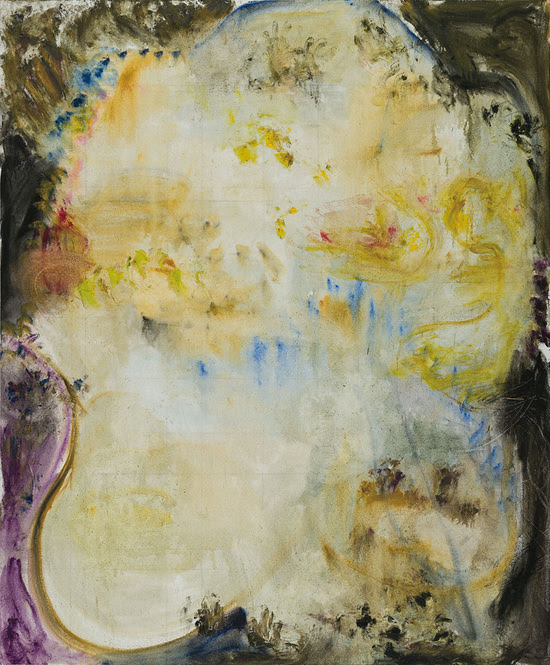중국화가 장엔리(张恩利) 개인전@하우저앤워스(1/25-4/7)
Hauser & Wirth New York
25 January – 7 April 2018

Zhang Enli, The Broken Sofa, 2017, Oil on canvas, 220 x 180 cm / 86 5/8 x 70 7/8 in
New York... Hauser & Wirth is pleased to present ‘The Garden,’ an exhibition of new paintings by Zhang Enli. A champion of overlooked spaces and objects, Zhang Enli works from sketches, photographs, and memories to render his experience of the world in variegated brushstrokes and intimations of figures. Grounded in his immediate surroundings, the artist's work involves a ceaseless scrutiny of ways of seeing. For the paintings on view in ‘The Garden,’ Zhang Enli has drawn inspiration from the gardens that punctuate the industrialized cityscape of Shanghai. His impressions of their complex organic forms, articulated in expansive, immersive paintings, provoke an uncanny sense of recognition.
Having achieved acclaim for his earlier figural paintings, Zhang Enli has dedicated recent years to developing his own abstract visual language. His latest works display an uninhibited, intuitive approach to color and form in the series ‘The Skeleton’ and ‘The Classical Painting,’ as well as ‘The Gold Arowana,’ a group of paintings that find Zhang Enli employing abstraction to explore the deceptively poetic aspects of everyday contemporary life.
‘Grey Parrot’ (2017) bears traces of Zhang Enli’s earlier paintings of pipes, water hoses, and tangled wires. But a perceptible shift has occurred. The artist’s gestures have taken on an increased dynamism, making the picture plane a site of creative energy and physical movement. In ‘The Parrot’s Wings’ (2017), Enli further abstracts the figure of the titular bird with large swaths of greens and yellows, evoking colorful plumage through animated strokes.
Influenced by traditional Chinese brush painting, works such as ‘The Decoration’ (2017) draw viewers’ attention to the absences between layers of washed pigment. Color and gesture convey a conflation of memory and observation rather than a truthful account of what the artist has seen. Muted tones and translucent marks make the subject seem not quite present, as if occupying a parallel reality where only the essence of an object can be seen.
Zhang Enli often magnifies his subjects until a specific fragment fills his frame. In the suite of five works titled ‘The Garden’ (2017), his palette shifts from verdant greens to earthy browns in landscapes evoking the foliage that lines Shanghai’s streets. Rather than sweeping vistas, Zhang Enli hones in on sections of dense vegetation to offer renderings that are not faithful duplicates, but highly personal impressions. By liberating his subject matter from the chaos of its contemporary urban environment, he hints at a more universal experience that transcends specific country or culture.
About the Artist
Zhang Enli was born in 1965 in the province of Jilin in China. In 1989, he graduated from the Arts & Design Institute of Wuxi Technical University and relocated to Shanghai to teach at the Arts and Design Institute of Donghua University, a transition that greatly affected his artistic practice and the evolution of his painting. Zhang Enli taught at the university until 2008, and continues to work in his Shanghai-based studio today.
Zhang Enli’s paintings have been featured in numerous important exhibitions, including solo exhibitions at Firstsite, Colchester, England (2017); Hauser & Wirth Zürich (2016); Moca, Taipei, Taiwan (2015); ShanghART H-Space, Shanghai, China (2015); Hauser & Wirth London (2014); Villa Croze, Genoa, Italy (2013; Institute of Contemporary Arts, London, England (2013); Hauser & Wirth Zürich (2012); Shanghai Art Museum, Shanghai, China (2011); Hauser & Wirth New York, 69th St (2011); Minsheng Art Museum, Shanghai, China (2010); and Ikon Gallery, Birmingham, England (2009), a presentation which travelled to Kunsthalle Bern, Berne, Switzerland (2009).
Zhang Enli’s work was also featured in the 1st Antarctic Biennale, Antarctica (2017); the Yokohama Triennale, Japan (2014); Kochi-Muziris, Kochi, India (2012); ‘On Contemporary Era – The First Chinese Oil Painting Biennial,’ Instituto Paranaense de Arte, Curitiba, Brazil (2011) and ‘10,000 Lives. The Eighth Gwangju Biennale,’ Gwangju, Korea (2010).






